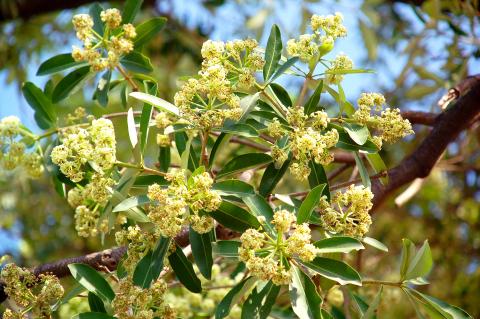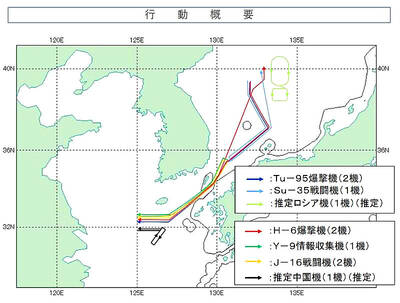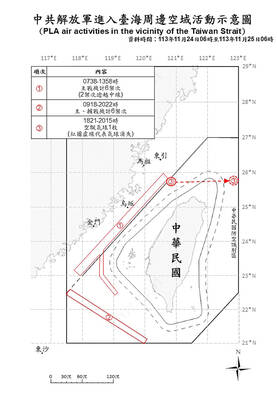A strong odor has recently been -plaguing the residents of Pingtung City during the night. Many of them thought it was the fault of the smokestacks in nearby industrial plants, but then discovered that the real culprit was a tree.
The smell that was making the residents feel nauseous and triggering headaches was coming from a type of evergreen tree called Alstonia scholaris — better known as the “Blackboard tree” or “Indian devil tree.” The tree is native to India and Southeast Asia, where its timber was commonly used to make blackboards for schools.
The neighborhoods of Yongsin Park (永新公園) have blackboard trees all around them and the trees’ intensely fragrant flowers bloom each November throughout the month.

Photo: Lee Li-fa, Taipei Times
During the night, the air becomes thick with the flowers’ pungent odor, preventing some people from sleeping. In the springtime, the trees produce wind-blown cotton seedlings that can cause health problems for asthmatics.
Residents’ patience with the trees has run out and they are demanding that the odor emitters be cut down. They say that if the city government cannot find a solution, they will demand compensation from the central government for the psychological and physical damage they have suffered due to the trees.
“I cannot stand it anymore. It stinks too much,” a resident said.
Officials from the Pingtung City Public Works Bureau said they receive a large amount of complaints during the tree’s flowering and seeding seasons. Aside from affecting some people’s health, the trees have adversely affected business at some local stores.
Some of the blackboard trees growing in schools and private households have already been felled and replaced with other varieties. However, officials say that blackboard trees in public spaces — such as those dotting the parks, river levees and sidewalks of the city — cannot be dealt with so easily as they propagate large numbers of seeds that have a rapid growth rate and thus their outward spread is not easily controlled.
An unnamed official at the Pingtung County Forestry Bureau said the offending trees did provide some advantages, such as being able to form leafy canopies that create shade in just a couple of years. However, he did add that another main drawback of the blackboard tree was its spongy wood, which makes it prone to toppling over in strong winds.
If people are not willing to chop the trees down, the official advised that they trim the leaves and branches just before the flowering season because this can prevent the release of the irritable odor and seedlings.
Officials from the Public Works Bureau said that they do not have the funds to carry out year-round trimming on all of the blackboard trees in the city.
However, they are planning to encourage schools and other public facilities to plant other types of trees when blackboard trees topple over in storms or die naturally to gradually phase them out.
Chen Chia-yin (陳嘉音), principal of the city’s Chihcheng Junior High School, said there used to be more than 30 blackboard trees at the school.
“Some of the trees are close to classrooms. The odor and release of the fibrous seedlings can severely affect students in class,” Chen said.
He said that the school asked the county government to cut some of the trees down and replace them with othes, and the school has only 10 trees left.

Theaters and institutions in Taiwan have received 28 threatening e-mails, including bomb threats, since a documentary critical of China began being screened across the nation last month, the National Security Bureau said yesterday. The actions are part of China’s attempts to undermine Taiwan’s sovereignty, it said. State Organs (國有器官) documents allegations that Chinese government officials engage in organ harvesting and other illegal activities. From last month to Friday last week, 28 incidents have been reported of theaters or institutions receiving threats, including bomb and shooting threats, if they did not stop showing the documentary, the bureau said. Although the threats were not carried out,

The Mainland Affairs Council (MAC) on Friday condemned Chinese and Russian authorities for escalating regional tensions, citing Chinese warplanes crossing the Taiwan Strait’s median line and joint China-Russia military activities breaching South Korea’s air defense identification zone (KADIZ) over the past two days. A total of 30 Chinese warplanes crossed the median line of the Taiwan Strait on Thursday and Friday, entering Taiwan’s northern and southwestern airspace in coordination with 15 naval vessels and three high-altitude balloons, the MAC said in a statement. The Chinese military also carried out another “joint combat readiness patrol” targeting Taiwan on Thursday evening, the MAC said. On

‘GRAY ZONE’ TACTICS: China continues to build up its military capacity while regularly deploying jets and warships around Taiwan, with the latest balloon spotted on Sunday The US is drawing up contingency plans for military deployments in Japan and the Philippines in case of a Taiwan emergency, Japan’s Kyodo news agency reported. They would be incorporated in a first joint operation plan to be formulated in December, Kyodo reported late on Sunday, citing sources familiar with Japan-US relations. A US Marine Corps regiment that possesses High Mobility Artillery Rocket Systems — a light multiple rocket launcher — would be deployed along the Nansei Island chain stretching from Kyushu to Yonaguni near Taiwan, Kyodo said. According to US military guidelines for dispatching marines in small formations to several locations,

The Mainland Affairs Council (MAC) yesterday confirmed that Chinese students visiting Taiwan at the invitation of the Ma Ying-jeou Foundation were almost all affiliated with the Chinese Communist Party (CCP). During yesterday’s meeting convened by the legislature’s Foreign Affairs and National Defense Committee, Democratic Progressive Party (DPP) Legislator Michelle Lin (林楚茵) asked whether the visit was a way to spread China’s so-called “united front” rhetoric, to which MAC Deputy Ministry Shen You-chung (沈有忠) responded with the CCP comment. The MAC noticed that the Chinese individuals visiting Taiwan, including those in sports, education, or religion, have had increasingly impressive backgrounds, demonstrating that the